University of Suffolk NEWS Issue 7 Spring/Summer 2019
WELCOME
One in four people will experience a mental health problem each year … we want to make Suffolk the best place in the world for talking about and taking care of mental health
(Suffolk Mind 2019)
At the University, we are not immune to mental health problems, whether it affects our students or staff. Being able to talk about this and support each other to achieve good mental health and resilience is something we can improve. In our sector, we are familiar with seeing headlines about students mental health but less is discussed when it comes to the mental health of staff.
Earlier this year, we conducted our bi-annual staff survey. We achieved a phenomenal response rate of 81.2%. A score of 70%-75% in the HE Sector is deemed good, so I am very pleased with the high level of engagement from our staff.
Staff engagement is important to us. Our staff are our biggest asset and it is our aim to have a great working experience, which is inclusive and provides opportunities to develop, grow and give our best. We know that getting the staff experience right also enriches the student experience.
In April, each of our Schools and Directorates received their own survey reports and we encouraged our Deans of School, Directors of Professional Services and Heads of Departments to discuss the results with their teams to identify what three issues could be addressed. Feedback is now being collated to identify best practice across the University and to inform an institutional action plan as a result.
In the meantime, the results and feedback so far highlight improvements to managerial support/ behaviours and performance reviews compared to our 2017 survey, and bring to light issues relating to
wellbeing and pace of change. Ensuring our staff have a good work/life balance is important to us and feedback suggests that staff wellbeing should be an area for focus over the next year to enhance our working experience. Our Students’ Union are already working with us on a number of initiatives to support students to enhance their mental health and wellbeing and there is more we can do together on this front.
I am pleased to say that we have agreed to partner with Suffolk Mind for the next two years in order to increase our understanding and actions, to support our staff appropriately. The School of Health Sciences has led the way in this, encouraging their teams to attend one of Suffolk Minds workshops and other staff across the University have also attended our own mental health first aid course.
I have engaged with Suffolk Mind programmes in order to understand their offer and have better insight into how they can help us to develop our staff support in this area.
As a starting point we have asked Suffolk Mind to conduct a Wellbeing Performance Audit to help us fully understand the needs of our staff and to address any concerns. Our Wellbeing Group will also be seeking feedback on the health and wellbeing goals of staff and students to help develop a fit-for-purpose Health Promotion Programme to provide all with opportunities to improve their mental and physical wellbeing whilst at work or whilst studying.
Finally, I will be leading and championing a ‘Wellbeing Working Group’ over the next year to pull together all wellbeing activity across the University for both staff and students. I look forward to engaging with many of you on our wellbeing journey and to continue to enhance our working and studying environment together.
Professor Helen Langton Vice-Chancellor
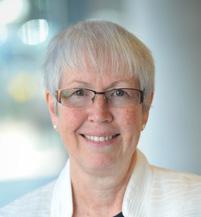
University of Suffolk NEWS Issue 7 Spring/Summer 2019 Page 1
WELCOME 1
IN FOCUS 2
Project gains national recognition 2 £6.4m for new skills and innovation project 3
3D Productivity Suite 4 Developing the world’s first augmented reality asthma app 5
News and updates 6
WhatUni Awards 2019 6 Suffolk Centre for Female Entrepreneurship wins national award 6
Innovative Approaches within Social Work Education 6 Domestic Abuse Research Network Launch 7 Nursing Students trip to RCN Congress 7 Erasmus+ 8
University’s new solar panels offer unique research possibilities 9
Bohemian Choir returns to the University 9
MBA international consultancy trip to Indonesia 10 2019 Keio Study Programme 11
Learning and Teaching Day and the launch of CELT 12 Social Work students visit the Netherlands for Social Work Week 12 Engage Programme – Free Membership 12
Research and publications 13
New study finds river wildlife contain cocaine, pharmaceuticals and pesticides 13 Thinking Seriously About Gangs 14 Digital Civility 14 Industry 4.0 and Engineering for a Sustainable Future 15 Lecturer launches children’s book 15 Sharing expertise in the field of AI 15 Events 16
Children and Childhoods Conference 16
Growing Sustainability: Natural Capital and Society in the Built Environment 16
Gals that game 16 Over to you 16
IN FOCUS
Project gains national recognition
The University’s Active Wellbeing Project is being featured in a national campaign. Universities UK’s MadeAtUni campaign aims to bring to life the impact of universities on everyday lives.
The Active Wellbeing Project, run by the Students’ Union (SU) and Student Services, is one of 100 individuals or groups based in universities whose work is saving lives and making a life-changing difference to our health and wellbeing.
The Active Wellbeing Project is being promoted as part of the ‘Nation’s Lifesavers’ campaign and aims to address isolation and mental health issues at university. The SU are giving six free fitness sessions to students who have been refereed by Student Services and a volunteer ‘buddy’ then accompanies them on a choice of ten sport activities ranging from yoga, zumba to futsal and badminton. The use of a ‘buddy’ is predicted to be successful due to results from the SU’s sports survey showing that attending sessions alone was a big engagement barrier.
Referred students are asked to complete the WarwickEdinburgh mental wellbeing scale before taking part in the sports and are asked to complete it following participation in the Scheme, to measure its impact.
The volunteers who have been recruited as part of the scheme receive mental health and first aid training and the project aims to provide early intervention for those who could struggle with mental health and wellbeing issues.
The SU are hoping that 300 people will benefit from the Active Wellbeing scheme, which was given £7,000 funding by British Universities & Colleges Sport (BUCS).
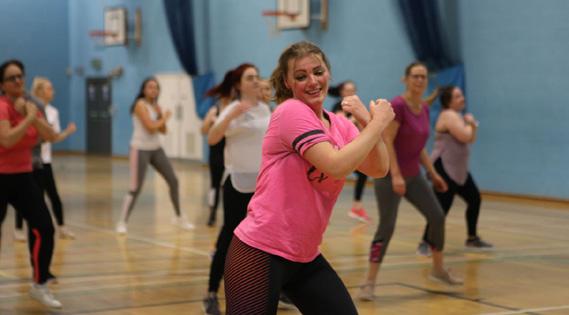
Issue 7 Spring/Summer 2019 University of Suffolk NEWS Page 2
Contents
£6.4m for new skills and innovation project
A unique partnership between the University and BT has been awarded £6.497m from the New Anglia Local Enterprise Partnership (LEP).
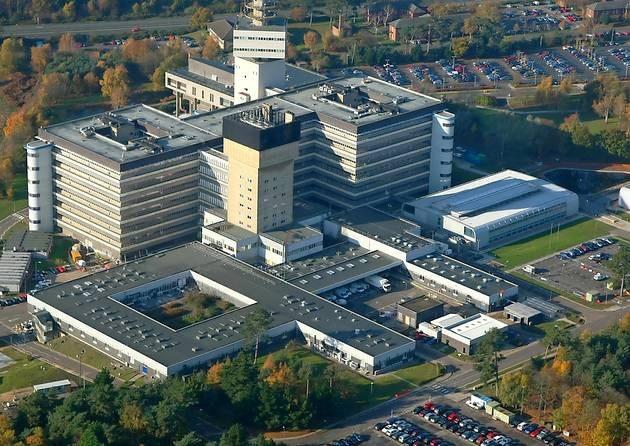
Professor Mohammad Dastbaz, Deputy Vice-Chancellor shares more about the project:
What will the money be used for?
The funding will enable the University to unite with BT, a world leading telecommunications company. We will establish a nationally significant ICT learning, research and training centre at Adastral Park.
How will students and the business community benefit?
Our aim is to transform how high-end technical education is delivered. The new world-class co -working specialist laboratories that will be developed will enable us, at the University, to transform our project-based learning where undergraduate and postgraduate students work collaboratively with businesses to solve industry challenges as an integral part of their education.
We will be able to offer apprenticeship education, a ‘solution centre’ for Small and Medium-sized Enterprises (SMEs) and other businesses as well as research and knowledge transfer opportunities.
This partnership will enable Suffolk to become a recognised destination for industry-focused ICT and Digital Creative degrees and an internationally recognised destination for lifelong learning and Continuing Professional Development (CPD).
What impact will the project have?
The partnership, between BT and the University, will undoubtedly help the region’s ambitions for economic growth and provide a vehicle for developing the high-end skills required. It will combine high quality academic capabilities, worldleading industrial research and development.
More about this project will appear in future editions of the newsletter.
University of Suffolk NEWS Issue 7 Spring/Summer 2019 Page 3 IN FOCUS
3D Productivity Suite
Thanks to a capital grant from Ipswich Borough Council, the University has acquired a state-of-theart 3D printer.


The industrial standard printer will sit within the University’s 3D Productivity Suite in the IWIC. It will provide a location where businesses involved in any form of product design, prototyping and manufacture will be able to explore the strategic relevance of 3D printing to their business.
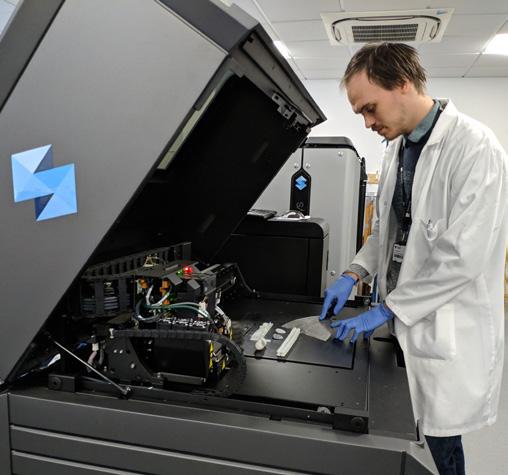
Businesses will be able to access support and guidance to help them become more innovative and competitive through adopting the most appropriate variant of the wide array of 3D technologies available.
Tom Ranson, 3D Productivity and Digital Media Technologist at the University of Suffolk said, “Traditionally when prototyping, especially with injection moulding, it can take months to pull together moulds for test parts. They can also be very expensive, especially if testing reveals the part needs to be adjusted as the mould would need to be remade as well. With 3D printing that time can be reduced to just a few days. A single part would take a few hours to print. The types of plastics will also open up new avenues of prototyping for Suffolk. New to us are the flexible plastics, high temperature plastics and the medical grade plastics. Simply put, if your business produces a physical component then it’s likely we can help fine tune its design in a matter of weeks rather than months, and at a vastly reduced cost.”
For more information about the 3D printing facilities, please visit www.uos.ac.uk/3d-printing or email 3dprinting@uos.ac.uk
Issue 7 Spring/Summer 2019 University of Suffolk NEWS Page 4 IN FOCUS
Developing the world’s first augmented reality asthma app

The University’s first Knowledge Transfer Partnership (KTP) has resulted in a revolutionary new app, which will help children with asthma.
Developed in partnership with the University by Stowmarket-based Orbital Media, the MySpira app improves the training of correct inhaler technique, using a combination of augmented reality and game play. MySpira is the world’s first metered dose inhaler training app to utilise the new augmented reality functionality, released by Google (AR Core) and Apple (AR Kit).
The University provided consultancy, research and development support and a graduate work placement.
Graduate, Tom Andrews, worked with Orbital Media on creating the App, experimenting with new technologies to determine their suitability and learning more about Augmented and Virtual Reality (AR and VR). Tom said, “If you are passionate about what you’re good at, you can take control and shape a project and make a real difference by being an Associate with a company like Orbital Media. I’ve also got a permanent job at the end of it. Everyone in the company has been very welcoming and my opinions and expertise in the field have been valued.”
Professor Mohamed Abdel-Maguid, Dean of the School of Science, Technology and Engineering, added, “We were excited about the challenge that Orbital Media brought to us. The instructions on how to use an inhaler correctly for asthmatic children doesn’t appear to be that complex yet millions of children across the globe lose quality of life as a consequence of incorrect use of inhalers. Working with Orbital Media, our teams brought together gaming technology with augmented reality and psychology to produce MySpira, a small innovation that can potentially transform the lives of millions of children. This is the value we want to create and the impact we strive to make through our research. We look forward to more KTP projects in the future.”
Director of Business Engagement and Entrepreneurship at the University of Suffolk, Stefanie Thorne, said “Brokering knowledge transfer partnerships (KTP), and projects between SMEs and our academic expertise at the University of Suffolk, is what the business engagement team within the Ipswich Waterfront Innovation Centre (IWIC) is here to do. Orbital Media has been a pleasure to work with and we are all extremely proud of the impact the product is having.”
In a recent study by the University of Suffolk’s Dr Suha Al-Naimi, 96 children aged 6 – 13 were analysed. It found a steady increase of information recall was observed with the MySpira app, over traditional asthma / inhaler education methods, such as leaflets and videos. Specifically, MySpira demonstrated an overall score that was 26% better than videos and 70% better than leaflets.
MySpira is available from the App Store and Google Play for asthma patients, schools, pharmacists, GP surgeries and hospitals to download onto smartphone or tablet devices.

University of Suffolk NEWS Issue 7 Spring/Summer 2019 Page 5 IN FOCUS
WhatUni Awards 2019
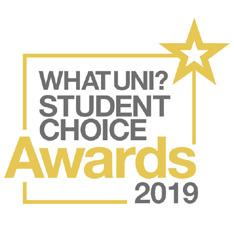
The University has been ranked in the top 10 for Course and Lecturers in the WhatUni Student Choice Awards 2019.
The Whatuni rankings are based on the opinions of university students collected over the last 12 months, asking reviewers to rate a wide range of categories. Now in their sixth year, the rankings offer prospective
students an unbiased, student-led alternative to traditional university ranking systems.
The University of Suffolk came 8th in the country for Course and Lecturers, 13th for Job Prospects, 20 th for Student Support and 25th in the UK for University of the Year- jumping 60 places from last year.
Suffolk Centre for Female Entrepreneurship wins national award
The Suffolk Centre for Female Entrepreneurship based at the IWIC has won an award from the UK Science Park Association (UKSPA). The Centre was given the Most Successful Project or Programme Award at an event in Birmingham.
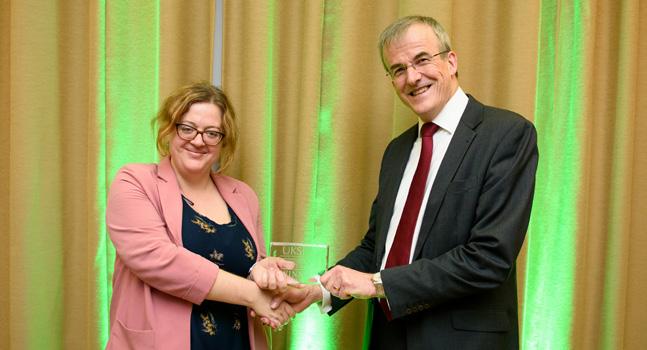
The UKSPA Awards recognise excellence in science, innovation and collaboration and celebrate the achievements and activities of its members and the impact, which they, and their tenant companies, have made to local, national and international economies and communities.

Innovative Approaches within Social Work Education
The eighth annual Practice Educator Conference for social workers across the region was held at the University and attracted over 120 delegates.
Supported by Essex County Council and the Suffolk and Norfolk Teaching Partnership, the event has a history of discussing pertinent issues in social work education and social work more generally.
The theme for this year’s conference was the use of reflection and supervision to enhance the teaching and learning for social work students whilst they are undertaking their practice placements.
Issue 7 Spring/Summer 2019 University of Suffolk NEWS Page 6 NEWS AND UPDATES
Domestic Abuse Research Network Launch
Following the ‘Approaches to Reducing Domestic Abuse’ conference in the autumn, as part of the Festival of Social Science, the University and partners have launched a Domestic Abuse Research Network.
Delegates at the conference expressed their interest in becoming part of the group to share good practice.
Dr Olumide Adisa, Research Fellow at the University of Suffolk, whose research and public engagement efforts has been a catalyst in the development of the Network, said “It is really exciting to see the many months of conversations with practitioners, commissioners of services, and researchers come to life in the form of the new Domestic Abuse Research Network. There is a huge value in building a multi-disciplinary community of researchers and practitioners where people can share ideas and learn from one another.”
“Members of the network will share research, practice and learning as well as explore collaborative research projects on domestic abuse and related areas that will have real impact on scholarship, practice, and policy.”
The steering group for the Network is drawn from University of Suffolk, University of Essex, University of East Anglia, Suffolk County Council, the Office for Police and Crime Commissioner for Norfolk and Domestic Abuse Specialist Organisations.
To find out more about the Network please visit www.uos.ac.uk/da-research-network
Nursing Students trip to RCN Congress
This year, 22 Adult Nursing students attended the Royal College of Nursing (RCN) congress, held in Liverpool. This annual event is a great opportunity for members to meet, learn, develop professionally and share excellent nursing practice across the UK.

There were a wide range of speakers raising awareness and encouraging changes within the nursing profession, and some of this year’s workshops covered NHS pay and uniforms, homelessness, rural healthcare and Sepsis.

Attendees heard from a service user who contracted sepsis and became a quadruple amputee, a situation that could have been prevented with earlier diagnosis. Our students found this session in particular very emotive and it has raised their awareness on the importance of understanding and completing certain checks when they are managing patients in practice.
All students also took part in various debates on role design and flexibility on the future of nursing. Anyone interested in finding out more about the RCN congress or attending next year’s event, please visit www.rcn.org.uk/congress
University of Suffolk NEWS Issue 7 Spring/Summer 2019 Page 7 NEWS AND UPDATES
Erasmus+
By Izabela Hutchins, Student Opportunities Manager, and Ellen Buck, Head Of Learning Services
As technology changes geographies and enables global networks, so it becomes possible for education to reach further. With close to 50,000 students studying programmes validated by institutions including St George’s Medical School, and the University of Nicosia, the University of Nicosia in Sub-Saharan Africa (UNICAF) is a leading light in a fast growing consumer market. They estimate that by 2030 an additional 50 million university seats will be needed across African nations. Yet 1.2 million qualified students are unable to get a university place right now. No wonder UNICAF are recruiting approximately 700 students every month.
Our trip, funded by the Erasmus+ programme, enabled us to find out how they see the education market in these countries expanding. We went to ask how they deliver their learning, how they market their programmes and how University of Suffolk may be able to become part of this exciting, but challenging, market.

Having received a tour of learning spaces and medical labs at the Nicosia campus, we moved onto their headquarters at the former Larnaca Airport, where a very impressive base is under construction. We spoke with students, researchers and teaching staff. Quality assurance teams, marketing leads, and student advisors as well as the CEO and Chief Academic Officer. We caught up with former colleagues who had worked at the University of Suffolk and discovered links between the UNICAF team and some of our academic colleagues from their time studying and teaching in the UK.
By the end of our trip, our very generous hosts had not only given us an excellent insight into their operation, but also opened up our eyes to the determination, commitment and hurdles UNICAF students face. As we move towards active, integrated and blended learning, African infrastructures require more of an “offline-online” approach where students have to travel to download materials on mobile devices, including phones, returning to their homes to complete activities before a return trip to download. It’s interesting to think about how this model may initially seem to be a step back for us in learning design and delivery, but it could actually help us understand some of the challenges in engagement that our own students face, when living complex lives.
Since coming back conversations have continued. UNICAF is now a validated partner, and we hope, by October they will be delivering our MSc Public Health to nearly 2000 students. We also look forward to exploring other subject areas, developing our relationship and shared commitment to providing higher education in what is a truly widening participation collaboration.
This visit was possible thanks to the Erasmus+ Grant funding secured by the University in 2018/19. It was the first international group staff training opportunity shaped to support professional development of staff from various departments. At the heart of this visit was not only exploring direct collaboration with UNICAF, but also to facilitate knowledge sharing and shadowing that contributes towards development of new, international projects and ideas.
Issue 7 Spring/Summer 2019 University of Suffolk NEWS Page 8 NEWS AND UPDATES
University’s new solar panels offer unique research possibilities
New solar panels have been installed on the roof of the Atrium Building in a joint initiative between the University and the Suffolk Climate Change Partnership.

The installation will provide innovative research opportunities as well as energy cost-savings of around 25% on the electricity they produce.
Justine Oakes, our Sustainability Manager, said “We are excited about the potential which the solar panel installation will offer our academic researchers within the Suffolk Sustainability Institute. Each panel is being fitted with the ability to communicate its performance back to a central software platform, providing invaluable real-time data.”
“One example we are exploring is a comparative study with green roof biosolar array panels to test the theory that such an approach can provide a
cooling effect and enhance panel performance during peak summer months, whilst simultaneously enhancing urban biodiversity.”
Bohemian Choir returns to the University
A moving account about the evacuation of children during the second world war from the Czech Republic was the subject of a performance by the Bohemian Choir at the University.
The Choir, from the Technical University of Liberec, returned to the University after a similar moving performance last year.

‘I’ll take that one’ was a combination of oral history and classical choral music by the 20-strong choir.
Jana Konvalinková from the Technical University of Liberec said, “Our performance this year was about stories and choral music from the start of the second world war, in 1939. The stories were about how war is difficult especially for children and how people helped. We found very moving music for the choir and the stories were very strong so all of that connected together to result in an emotional
performance, to open the hearts and minds of the audience. We have always found open arms and open hearts for our performances when we come here.”
Through the choir, links have been established between the two Universities, especially with the University of Suffolk’s History department.
University of Suffolk NEWS Issue 7 Spring/Summer 2019 Page 9 NEWS AND UPDATES
MBA international consultancy trip to Indonesia
By Dr Tom Vine, Associate Professor and PhD Programme Coordinator
This year’s MBA consultants - Jerusha David, James Fulker, Tejas Thakerar, and Sandra Vingilytetravelled with me to Jakarta earlier this month. They were tasked with consulting for Baraka Nusantara.

Baraka Nusantara is a social enterprise which aims to empower local people in less developed, rural parts of Indonesia. The organisation has already successfully completed projects to support coffee farmers by re-introducing Sembalun’s specialty coffee to the Indonesian coffee industry. It has also built a local school and enhanced the quality of education in Desa Sembalun, in rural East Lombok.
Baraka Nusantara engaged the services of our students to assist with the strategic development and promotion of an eco-jewellery line of products, hand-crafted from waste plastics. The products themselves are extremely well designed, and have been developed with the upper end of the market in mind: the jewellery has even been showcased on the catwalk at Indonesian Fashion Week! However, although well-regarded in Indonesia, the target market for these products is western customers, and this is where our students came in.
Drawing on the international marketing skills cultivated at Suffolk Business School, general crosscultural guidance from our hosts at Binus Business School, and invaluable fact-finding visits to both the ASEAN Secretariat and British Embassy Jakarta, the students developed a sophisticated international marketing strategy for the social enterprise, as well as providing guidance on more practical aspects of the business including operations, logistics, website design/content and specific social media techniques.
The students impressed us all, particularly the client. They were awarded 75%, a distinction, for their presentation and are now working on the final written report.
Congratulations to our travelling MBA student- consultants!
Issue 7 Spring/Summer 2019 University of Suffolk NEWS Page 10 NEWS AND UPDATES
2019 Keio Study Programme
By Samantha Chenery-Morris Associate Professor in the School of Health Sciences and Head of Subject: Nursing and Midwifery
For this year’s study tour hosted by Keio University in Japan in February 2019, we were delighted that four students from the School were able to attend the ‘Challenge for an Ageing Society as a Global Health issue and the Role of Nurses’ programme:-
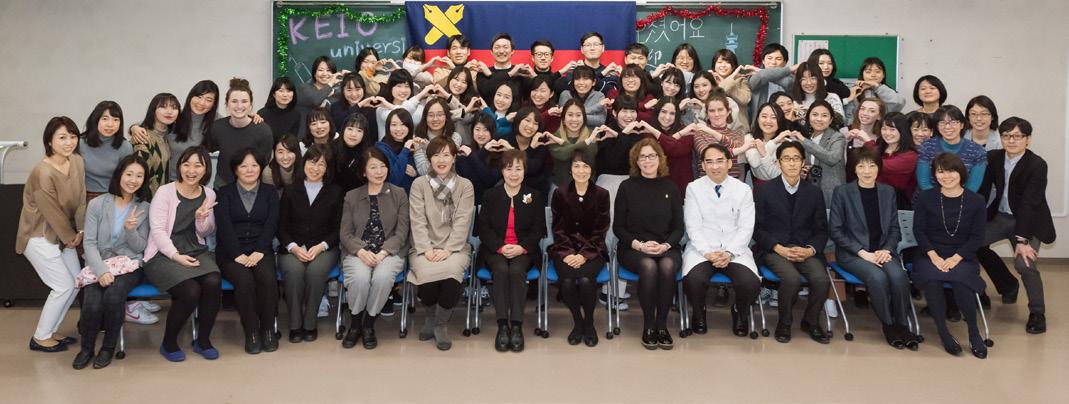
Camille Babilonia, 09/17 Adult Nursing
Carly Ryder, 09/17 Child Health
Hannah Clayden, 02/18 Adult Nursing
Verity Juster, 09/18 Adult Nursing
The University of Suffolk students and their counterparts from universities in Korea, China and America spent five days, alongside their fellow Keio students, experiencing theory and nursing practice in Japan and learnt first-hand how this differs from provision in other countries.
This year, Paul Driscoll-Evans, Dean of the School of Health Sciences, was invited to lecture on ‘Team Activities by Inter-professional Work’ to Keio students who are majoring in medicine, nursing, and pharmacy as they prepare for their primary care fieldwork trip to Laos. During his tour of the Keio campus, Paul held meetings with several Faculty staff, including Professor Hiroko Komatsu, Dean of the Faculty of Nursing and Medical Care, Prof Hiroki Fukahori, Professor of Gerontological Nursing, and Professor Mitsuhiro Kamakura, Chair
of International Exchange Committee, Faculty of Nursing and Medical Care.
Following on from Paul’s successful visit, we are delighted that we have now signed a Memorandum of Understanding with Keio which will facilitate further joint ventures in the years ahead.
I travelled to Japan to support the students during their study tour and to establish new connections for the School. I was able to visit various midwifery services and to meet with my Keio counterparts which will further strengthen our links with Keio.
In preparation for the visit to Japan, we were delighted to welcome Andrew Lambert, HR Manager, and Yumie Hurrell-Kanamoto, Dietician, from Ichiban UK to the University. Ichiban are the UK’s largest producer of sushi and are based in Stowmarket. Andrew and Yumie very generously provided a wide range of delicious sushi products for the students to sample. This was a first for most of the group and gave them an opportunity to learn about Japanese food and to get some tips and advice for their stay in Japan from Yumie.
We eagerly await the visit from Keio students in September 2019 when we can return their very generous hospitality and the friendship shown to our students and staff during our stay in Japan.
University of Suffolk NEWS Issue 7 Spring/Summer 2019 Page 11 NEWS AND UPDATES
Learning and Teaching Day and the launch of CELT
The new Centre for Excellence in Learning and Teaching (CELT) was launched at this year’s Learning and Teaching Day.
The event was run in a ‘world cafe’ style to encourage conversation and knowledge sharing on a range of topics including research-informed teaching, creative approaches to learning and teaching, integrated working with academic colleagues and pedagogic research.
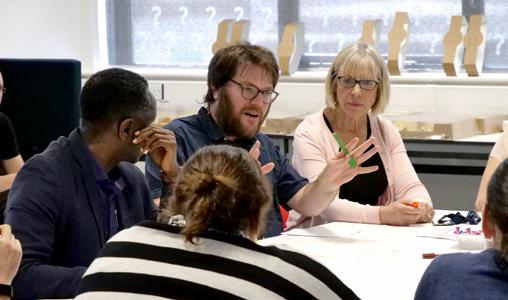
Social Work students visit the Netherlands for Social Work Week
By Suzanna Pickering, Senior Lecturer and International and Erasmus Co-ordinator for Social Work
Nine University of Suffolk Social Work students visited Saxion University in the Netherlands for International Social Work Week.
Rosemary Willers, Lecturer in Social Work and I joined the students for the final two days and enjoyed discussing and debating their learning and were able to capture the student’s experience to bring back to the BA (Hons) Social Work programme. The students appeared to
have grown in confidence and talked about how knowledgeable they felt when meeting their peers from other international universities. We hope that the students’ visit will encourage other social work students at level 6 to take up the Erasmus Social Work exchange opportunities developed five years ago by myself and Dr Sue Hollinrake.
Rebecca Dobbin, student social worker, said, “A trip to remember throughout my career... such an amazing experience to learn about other cultures and meeting new people... I would recommend it to any student social worker.”
Engage Programme – Free Membership
The Business Engagement and Entrepreneurship team is joining Enterprise Nation helping you start, grow, and stay successful in business.
Thanks to Funding from the University of Suffolk Foundation Board, 40 participants (20 Students and 20 Alumni) will have the opportunity to apply for free membership with Enterprise Nation for 12 months.
For more information about becoming an Enterprise Nation member, please contact enterprise@uos.ac.uk
Issue 7 Spring/Summer 2019 University of Suffolk NEWS Page 12 NEWS AND UPDATES
New study finds river wildlife contain cocaine, pharmaceuticals and pesticides

For the first time, researchers at the University of Suffolk and King’s College London, have found a diverse array of chemicals, including illicit drugs and pesticides in UK river wildlife.
The study which was published in Environment International, looked at the exposure of wildlife, such as the freshwater shrimp Gammarus pulex, to different micropollutants (chemicals found at exceptionally low levels) and the levels of these compounds in the animals.
Consumer products, medicines and drugs can end up in rivers after use and comprise thousands of different chemicals which have the potential to cause environmental harm. The team collected samples from five catchment areas, and 15 different sites across the county of Suffolk. Surprisingly, cocaine was found in all samples tested, and other illicit drugs such as ketamine, pesticides and pharmaceuticals were also widespread in the shrimp that were collected.
Professor Nic Bury said “Whether the presence of cocaine in aquatic animals is an issue for Suffolk, or more widespread an occurrence in the UK and abroad, awaits further research. Environmental health has attracted much attention from the public due to challenges associated with climate change and microplastic pollution. However, the impact
of ‘invisible’ chemical pollution (such as drugs) on wildlife health needs more focus in the UK as policy can often be informed by studies such as these.”
Dr Leon Barron from King’s College London added “Such regular occurrence of illicit drugs in wildlife was surprising. We might expect to see these in urban areas such as London, but not in smaller and more rural catchments. The presence of pesticides which have long been banned in the UK also poses a particular challenge as the sources of these remain unclear.”
Since the research was published, Natural Resources Wales has asked for further survey work. A collaboration with the University of Portsmouth to conduct preliminary studies on effects of cocaine on behaviour of freshwater shrimp is underway and it has led to a recent application to the Leverhulme Trust to investigate how widespread illicit and drugs of abuse contamination is in English rivers and wildlife and the effect they may have on these organisms.
The research has received widespread global print and on-line media coverage, including the BBC, The Guardian, CNN, The Smithsonian as well as local television and national radio and programmes like Have I got News for You and US show Late Night with Seth Meyers
University of Suffolk NEWS Issue 7 Spring/Summer 2019 Page 13 RESEARCH
AND PUBLICATIONS
Thinking Seriously About Gangs
Senior Lecturer in Criminology, Dr Paul Andell, has just published his latest work on street gangs in the UK.
Thinking Seriously About Gangs argues that policy formations in the UK aimed at addressing street gangs preceding and succeeding the English riots of 2011 have encompassed positions of both gang denial and gang blame. The policy pendulum of denial and blame raises questions about where UK gang-policy stands, and which ideas and influences have framed our responses to this issue. To find out more click here
Dr Andell’s expertise in gangs and county lines has been called upon in recent months by the media in regards to the Tavis Spencer-Aikens murder trial in Ipswich. He was also consulted by scriptwriters on a county lines story in EastEnders and continues to advise policymakers with his position on the All Party Parliamentary Group on Drugs Crime and Alcohol. The group formed of MP’s, Lords, and practitioners are responsible for forming ideas for drug policy reform.
Digital Civility
A resource developed by the University to encourage safety online is being rolled out to Universities across the UK.
The self-review toolkit was developed by Professor Emma Bond in partnership with Professor Andy Phippen at the University of Plymouth. It is being actively promoted by the independent regulator of higher education in England, the Office for Students (OfS).
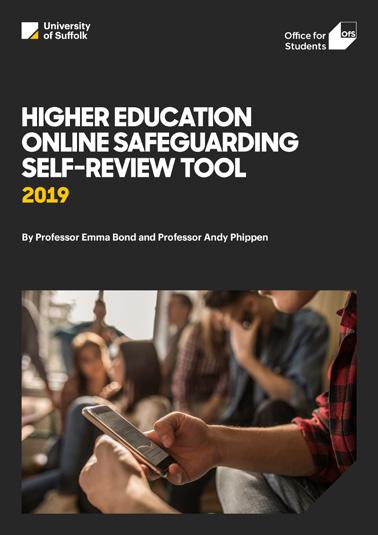
It was created in response to the growing risk that online can pose and to ensure safeguarding measures. The tool, which can be found at www.uos.ac.uk/content/digital-civility, enables higher education providers to assess themselves in 23 areas, at four levels, grading themselves a score of zero to three.
Professor Emma Bond said, “While student safeguarding is a wellestablished responsibility for UK higher education institutions, good practice in online safeguarding is only recently becoming recognised across the sector. In spite of a duty of care accorded to UK universities to act reasonably in students’ best interests, to protect their well-being and to provide support as they continue in education, there remains a lack of guidance in relation to current practice and regulation around online safety within higher education. In response, our tool – developed by the University as part of the Office for Students Catalyst funded programme to support good practice in safeguarding students – focuses on tackling sexual violence, hate crime and online harassment, and is designed for higher education institutions to self-review their online safeguarding practice.”
Issue 7 Spring/Summer 2019 University of Suffolk NEWS Page 14
RESEARCH AND PUBLICATIONS
RESEARCH AND PUBLICATIONS
Industry 4.0 and Engineering for a Sustainable Future
The fourth, and final, book in a series by Professor Mohammad Dastbaz, Deputy Vice-Chancellor, has just been published entitled Industry 4.0 and Engineering for a Sustainable Future.
This unique volume considers the emergence of “Industry 4.0” (i4.0) and the many ways the multifaceted field of Engineering is transforming our ideas and our options around sustainability.
It points to emerging technological advances that are facilitating industrial process improvements to artificial intelligence’s promise to help us live “smartly” and manage energy demand.
Lecturer launches children’s book
Engineering for a sustainable future is an exploding area of research. This book provides coverage of key case studies from industrial partners such as Ericsson, BT, BMW, Matrixx and research from different UK and international institutions including from the University of Suffolk.
Chapter download data from Springer site indicates that the four books have had a combined download of 49,107.
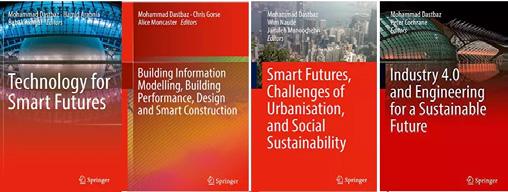
Rob Ramsden, lecturer in Graphic Design and Illustration, has launched his first children’s book, entitled ‘I saw a BEE’.

Rob said, “The simple message in ‘I saw a BEE’ is BEE friendly, in every sense. A little boy is alarmed when he discovers a bee, at first he is frightened and reacts aggressively, but gradually he realises that the bee won’t harm him and that they can be friends.”
Antenna, Royal Entomological Society have said, “At a time when insects are in steep decline, ensuring that the next generation has a positive attitude to the natural world is imperative. Here is a book that will initiate that mind set. Parents, Grandparents and children will all enjoy reading or listening to this over and over again.”
Rob’s second book in the series, ‘We saw a SEED ’ is due for publication in August, and a third book will follow in 2020.
Sharing expertise in the field of AI
The University’s Visiting Professor of Digital Economy and Strategic Innovation Management, Dr Peter Cochrane OBE, has spoken at an Artificial Intelligence (AI) Symposium, held at the Natural History Museum.
The event explored the rapid evolution of AI, as well as how developments in technologies such as
chatbots and Natural Language Processing (NLP) are improving operational efficiency and customer engagement.
It is estimated that by 2020, there will be 7 billion consumer devices with AI-powered digital assistants and 85% of customer interactions will be automated.
University of Suffolk NEWS Issue 7 Spring/Summer 2019 Page 15
Children and Childhoods Conference

16 and 17 July 2019
Marking 25 years of Early Childhood Studies at the University of Suffolk and the formal launch of our new Centre for the Study of Children and Childhood (CSCC), the 4th Biennial Children and Childhoods Conference will cover a broad range of topics, and usually attracts an international audience.
The keynote speakers will be Heather Montgomery from the Open University and Tom Cockburn from Edge Hill University.
Growing Sustainability: Natural Capital and Society in the Built Environment
11–12 September 2019
The built environment has a greater impact on natural resources and produces more waste than any other industry. The International SEEDS (Sustainable Ecological Engineering Design for Society) Conference, to be held for the first time at the University of Suffolk, aims to bring together experts from around the world focusing on the changes that are taking place and the benefits or consequences that are being predicted and measured regarding the built environment’s impacts.
This event is a partnership between the University of Suffolk, Leeds Beckett University and Dublin Institute of Technology.
Bookings can be made on the Leeds Beckett website here.
Conference tickets include the Gala Awards Dinner on 11 September.
Gals that game
2 and 3 August 2019
The Suffolk Centre for Female Entrepreneurs is hosting ‘Gals that Game’, the first all-female games jam at the University, offering a friendly and supportive environment for those interested in exploring the field of game development.
Gals that Game provides the ideal opportunity for women (over 18’s only) to find out more about the games development industry, as well as a forum to share and put into practice creative ideas with likeminded people.
Over to you
To find out more about our events please visit www.uos.ac.uk/events
We
If you have any feedback and suggestions for content please get in touch by emailing Atlanta Blair at atlanta.blair@uos.ac.uk
Thank you.
Issue 7 Spring/Summer 2019 University of Suffolk NEWS Page 16 EVENTS
want this newsletter to be a reflection of all of the excellent projects, research and work being undertaken by our staff.
























